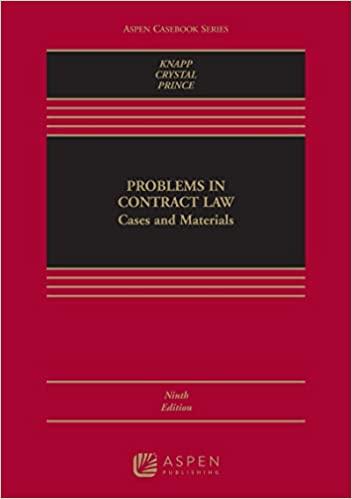Question
Why is past consideration no consideration at all? A. The adequacy of past consideration is difficult to determine. B. Past consideration is considered to be
- Why is past consideration no consideration at all?
A. The adequacy of past consideration is difficult to determine.
B. Past consideration is considered to be illusory.
C. Past consideration may involve parties who are not involved in the current contract.
D. Past consideration was provided before the current contract was made, and the current contract requires a benefit that has not yet been conferred.
6 points
QUESTION 2
- Advertisements are generally not considered to be offers but, rather, invitations to make an offer. Under what circumstances is that general rule not applied?
A. When the advertisement appears in writing, as in a newspaper advertisement
B. When the item advertised for sale has a sales price of less than $500
C. When the advertisement is for a discontinued item and the price is stated
D. When the advertisement specifies a limited quantity of the item advertised and specifies the means by which the item can be purchased
6 points
QUESTION 3
- The common law of contracts is summarized and organized in the:
A. restatement (Second) of the Law of Contracts.
B. Uniform Commercial Code.
C. National Reporter System.
D. decisions of the U.S. Supreme Court.
6 points
QUESTION 4
- What does the mailbox rule provide?
A. That the response to an offer is effective when that response is placed in a mailbox
B. That if an offer is mailed to an offeree, that offer must be accepted by mail by the offeree
C. That an acceptance but no other response is effective when that acceptance is placed in a mailbox
D. That some offers can only be communicated to the offeree by mail
6 points
QUESTION 5
- The elements necessary to create an enforceable contract are:
A. intent, definite terms, and communication to the offeree.
B. an offer and acceptance of that offer.
C. genuine assent and proper form.
D. agreement, consideration, capacity, and legality.
6 points
QUESTION 6
- Why do courts usually not consider the adequacy of consideration for a contract?
A. Courts do not usually have the information necessary to determine adequacy of consideration for a contract.
B. Courts will not set aside a contract because one of the parties to the contract was not prepared to get the best deal for themselves.
C. Courts do not determine questions of fact in dealing with contracts.
D. The Constitution prohibits government from interfering with the validity of contracts.
6 points
QUESTION 7
- If Tim says to Ann, "I will sell you my laptop for $300," and Ann responds, " I will buy your laptop, but I will only pay $250," is a contract formed?
A. Yes, there has been an offer and an acceptance, and the mirror image rule does not apply.
B. Yes, because Ann's response was not rejected by Tim.
C. No, because Ann has made a counteroffer that is a rejection of the original offer.
D. No, because the contract must be in writing.
6 points
QUESTION 8
- One of the elements of an offer to make a contract is intent. What standard do courts use to determine if an offeror intends to enter into a contact?
A. Courts consider what the offeror is thinking at the time the offer was made.
B. Courts consider only the words that are actually stated in the contract to determine the offeror's intent.
C. Courts are concerned only with the outward manifestations of the offeror's intention to enter into a contract.
D. Courts will consider all of the circumstances surrounding the making of the contract, including what the offeror said and what the offeror must have been thinking.
6 points
QUESTION 9
- What is the consideration for a bilateral contract?
A. The performance of the act that is promised by each party to the contract
B. That no consideration is required for a bilateral contract
C. The exchange of promises by the parties to the contract
D. The act of one party and the promise of the other party
6 points
QUESTION 10
- How does an offer differ from an option contract?
A. An offer has to be communicated before it can be accepted, but an option contract does not have to be communicated.
B. An offer must contain definite terms, but an option contract is simply an outline of a proposed agreement.
C. An offer can be revoked by the offeror at any time before the offeree accepts the offer, but an option contract cannot be revoked by the offeror until the time stated in the option contract has expired.
D. An offer is valid until it is rejected by the offeree, but an option contract ends at the option of the offeror.
Step by Step Solution
There are 3 Steps involved in it
Step: 1

Get Instant Access to Expert-Tailored Solutions
See step-by-step solutions with expert insights and AI powered tools for academic success
Step: 2

Step: 3

Ace Your Homework with AI
Get the answers you need in no time with our AI-driven, step-by-step assistance
Get Started


